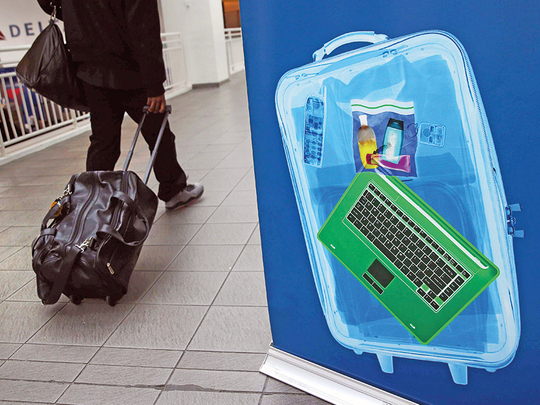
Washington: Intelligence showing that Daesh is developing a bomb hidden in portable electronics spurred the United States and Britain on Tuesday to bar passengers from airports in a total of 10 Muslim-majority countries from carrying laptop computers, iPads and other devices larger than a cell phone aboard direct inbound flights, two senior US counterterrorism officials said.
Two additional US officials said the explosives were designed to be hidden in laptop batteries. All four spoke on condition of anonymity as they were not authorised to publicly discuss the sensitive information.
The Trump administration maintained that the new restrictions did not signal a credible, specific threat of an imminent attack. Officials said the alert reflects concerns that the Daesh is ready — or soon will be — to launch new capabilities against the West.
Q&A: How the device ban may affect you
Sean Spicer, the White House press secretary, declined to address the intelligence during a news media briefing on Tuesday.
Officials said passengers still could carry cell phones and other small devices into the aeroplane’s cabin, while larger items like laptops would have to be stowed with checked luggage.
In all, airports in 10 countries, stretching from North Africa to the Mideast and into Turkey, are affected by the new restrictions. Both the United States and Britain have imposed the ban on flights from some airports in Egypt, Jordan, Saudi Arabia and Turkey.
Washington also has restricted some flights from Kuwait, Morocco, Qatar and the United Arab Emirates. London, meanwhile, has additionally restricted flights from some airports in Lebanon and Tunisia.
The targeting of a jetliner using explosives shows how the Daesh, which has long worked to inspire terrorist attacks, is trying to compete with groups like Al Qaida’s affiliate in Yemen. The Qaida affiliate has spent years inventing explosives that are difficult to detect, including trying to disguise bombs in devices like cell phones. Now, US intelligence officials believe the Daesh has also developed explosives that can be hidden in electronic devices, one of the senior counterterror officials said.
Republican Rep. Peter King, who sits on the House Intelligence and Homeland Security committees, said that government officials had called him on Saturday to alert him to the impending ban.
“It was based on intelligence reports that are fairly recent,” King said in a telephone interview. “Intelligence of something possibly planned.”
The Department of Homeland Security said the restricted items on flights to the United States included laptop computers, tablets, cameras, travel printers and games bigger than a phone. The restrictions would not apply to aircraft crews, officials said in a briefing to reporters to outline the terms of the ban.
The US ban on electronics applies only to flights on foreign carriers. It does not affect US-operated airlines, since they do not fly directly to the United States from 10 designated airports in eight countries — Amman, Jordan; Cairo; Istanbul; Jidda and Riyadh in Saudi Arabia; Kuwait City; Casablanca, Morocco; Doha, Qatar; and Dubai and Abu Dhabi in the United Arab Emirates. Officials did not say how long the ban would remain in place or if other airports would be added.
In all, an estimated 50 flights each day into the United States would be affected. One of the world’s busiest airports, in Abu Dhabi, already requires US-bound passengers to undergo strict screening by United States customs officials before boarding flights. Abu Dhabi is one of 15 airports in the world to employ the Homeland Security preclearance techniques.
Several hours after the US action, the British government announced its own ban on electronic devices on flights.
The British ban affects domestic and foreign airlines, including British Airways, the country’s largest. Foreign airlines affected by the order include Turkish Airlines, EgyptAir and Royal Jordanian, among others, and it affects direct flights to the United Kingdom from Turkey, Lebanon, Jordan, Egypt, Tunisia and Saudi Arabia.
A British official said the UK ban resulted from the combination of an evolving threat picture and a proliferation of electronic devices that airline passengers carry on board.
Examples of attacks by extremist groups against transportation hubs over the past two years include the October 2015 bombing of an airliner in Egypt, the attempted airliner downing in Somalia last year and armed attacks against airports in Brussels and Istanbul in 2016.
The Homeland Security Department’s new ban appeared to take officials from some of the affected countries by surprise.
Ahmet Arslan, Turkey’s transport, maritime and communication minister, said the ban would be harmful to the United States’ airline industry — and to Turkey’s.
“Our problem is not how the practice would take place,” Arslan said. “The issue is, it can decrease the comfort of the passengers and reduce the numbers of passengers. We are emphasising that this is not in the benefit of passengers, and we think that they should step back from this or ease it.”
Counterterrorism experts seemed equally divided over the need for the device ban. Michael Chertoff, the former Homeland Security secretary, said the new policy made sense given the threats to aircraft from explosive devices and concerns about screening at the targeted airports. “The challenge is to balance security without making it impossible to fly,” Chertoff said. But Erroll Southers, director of the Homegrown Violent Extremism Studies Program at the University of Southern California, said the new guidance would do little to enhance security. “This does little to minimise the threat of a remote-controlled IED,” he said, referring to improvised explosive devices hidden in checked baggage.
— New York Times News Service












